Kasia Niewiadoma on her dramatic Tour de France win: ‘The suffering was insane, the worst thing I’ve ever done’
Kasia Niewiadoma pulled off one of the most thrilling Tour de France wins in the race’s long history and tells Lawrence Ostlere about the agony and ecstasy of conquering Alpe d’Huez to win the yellow jersey

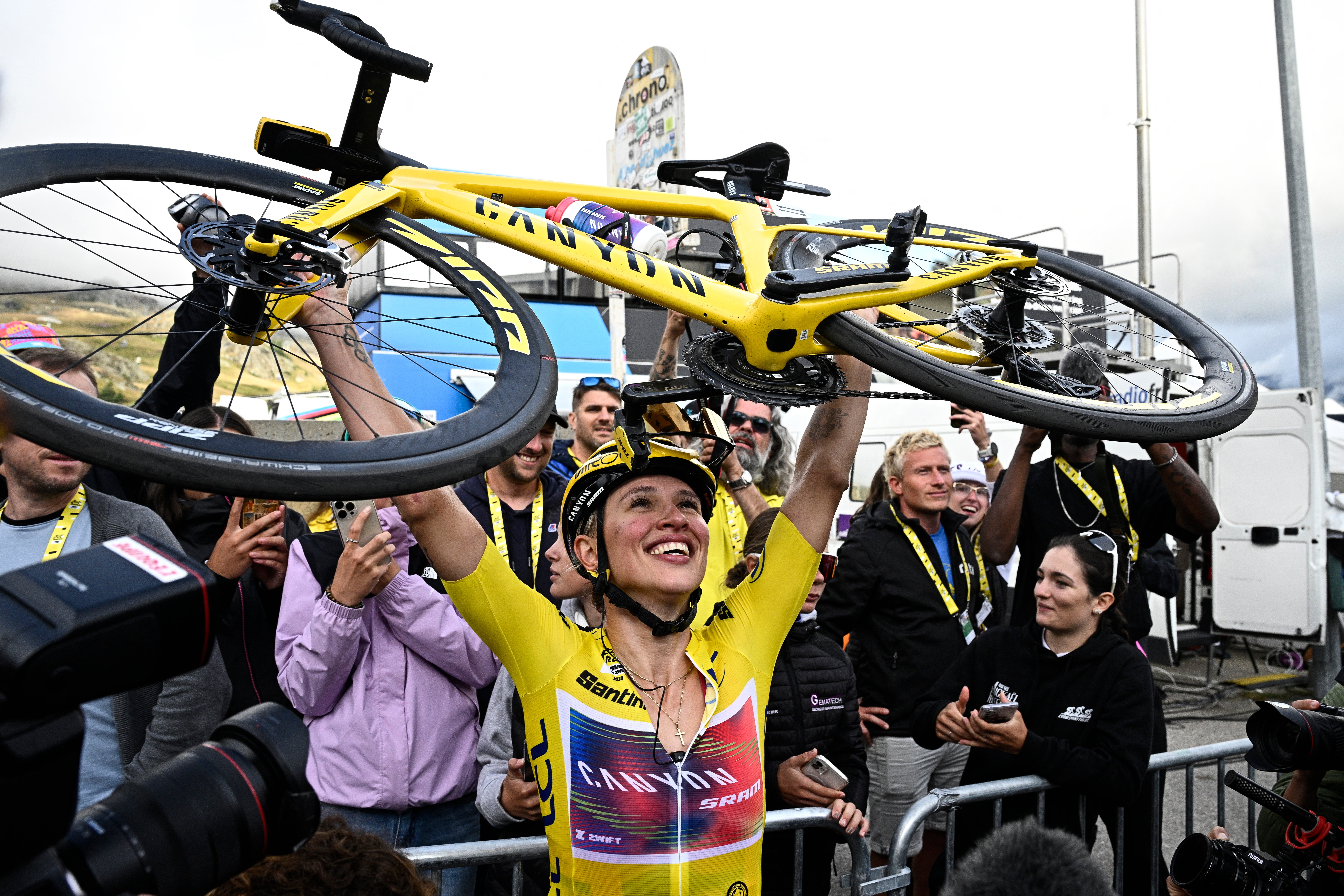
Kasia Niewiadoma still can’t believe she won the Tour de France. She knows she did because half of Poland has sent congratulatory messages, from famous footballers and the world’s No 1 tennis player Iga Swiatek to the president Andrzej Duda. “I feel like someone special, for sure,” she smiles. But the achievement is still sinking in.
“I have these realisations where I look at my husband and we just start laughing,” says Niewiadoma, who is one half of cycling’s power couple with American former rider Taylor Phinney. It is three days later and she is speaking from their home in Girona, Spain. “We’re like, what the heck?! We just cannot even comprehend it.”
It was a finish for the ages, a 950km race won by four seconds, about the length of time it takes to read this sentence. Niewiadoma had twice come third at the Tour before and her palmares told a tale of near misses. At 29, she wondered if her statement win would ever come. Yet here she was at the start of the final day, wearing the yellow jersey, being hunted by a pack of rivals that included the great defending champion Demi Vollering.
Vollering surged for home on the penultimate climb and a drained Niewiadoma couldn’t follow. “I felt like I had nothing to connect my body with,” she says. “I couldn’t find the right rhythm. I felt like I’d lost it.”
Vollering evaporated her overnight deficit of 1min 15sec but soon found herself stuck with another podium contender, Pauliena Rooijakkers, who refused to take turns pulling in the wind. Vollering got so frustrated she pushed Rooijakkers on the shoulder, as Niewiadoma cut some of the gap and replenished before the final climb: Alpe d’Huez and its 21 hairpin bends.
The finish line waited 1,580m above her in the clouds, at the end of 14km of steep mountain road, requiring an hour of agonising effort with no clue whether it would be worth anything at the end. Niewiadoma grimaces as she remembers the pain.
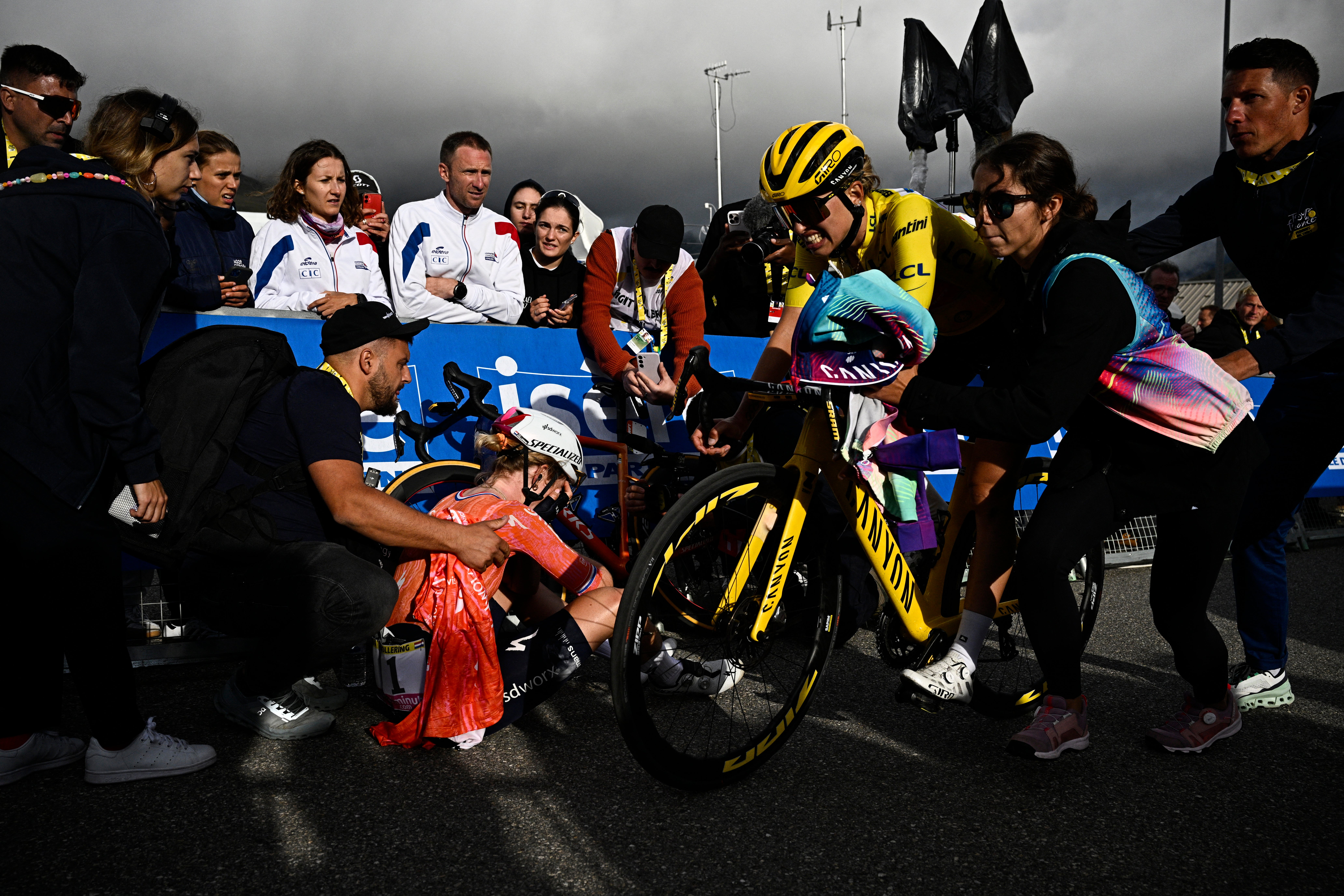
“The final climb started going steady and feeling powerful, to then, everything turning into a nightmare,” she says. “The suffering is so insane because it hurts you on so many levels. You cannot think clearly. You don’t see anything. It’s just, like, existing in it.
“The last three Ks were insanely hard, like hard in a way that I’ve never experienced on a bike – and after already such a hard stage race. It’s just emptying yourself to the fullest.”
Niewiadoma crossed the line and collapsed in a heap against a metal railing, and for a fleeting moment she had no idea who’d won. Confirmation came via screaming team directors in her earpiece.
There were tears everywhere with riders in pieces on the road like an artwork. Behind it all was a mosaic of moments that denied Vollering: the photo finish which lost her vital bonus seconds on stage four; the crash on stage five; the race tactics that left her isolated on the final climb. By contrast, it all came together for Niewiadoma.
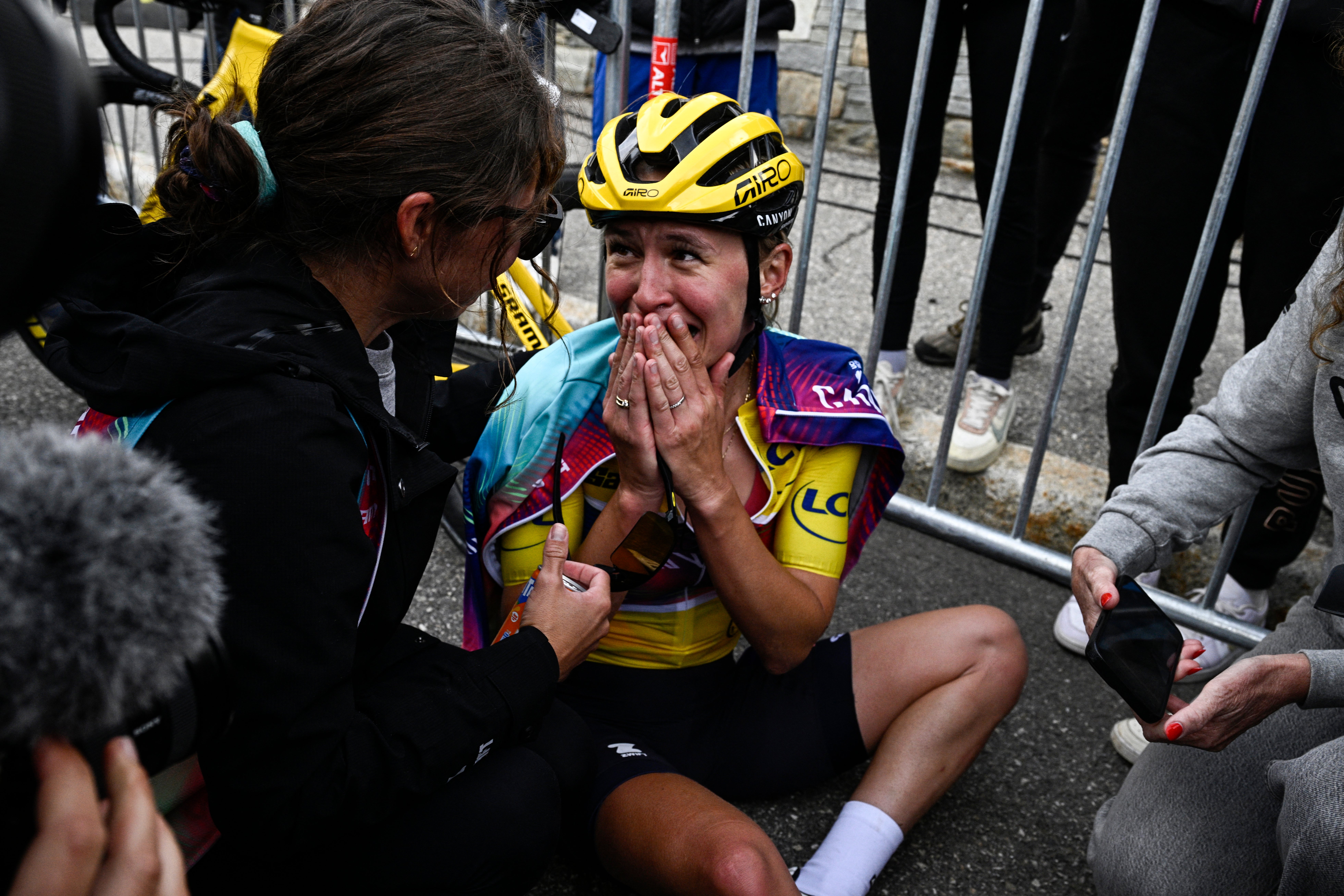
“On this climb, I cannot lie, it was really terrible,” she says. “It was the worst thing I’ve ever done, and to actually be rewarded for that, it just felt absolutely amazing, like super satisfying. It’s hard to explain but the happiness you feel, first of all, that everything is finished finally and that you don’t have to suffer anymore, and that you won and everything went as we wanted it to go. It was just an explosion of so many good feelings.”
I think I will never watch it to be honest! I experienced it once and I think it’s enough
This, of course, is the point of the Tour de France. It was designed by Henri Desgrange, a Parisian maniac whose dream bike race was so gruelling it would have only one survivor. Through most of the 20th century there were few chances for women to confront the true cruelty of the Tour. The single-day La Course set up in 2014 was a bow to pressure from the peloton but it was a gesture of appeasement, not a full-scale launch.
Versions of the women’s Tour have been invented, cancelled, reborn and respun over the years, but finally the Tour de France Femmes is showcasing women’s cycling over hard stages on brutal Alpine climbs. In 121 years of the Tour de France, a race largely fenced off by men for men, the third Femmes produced perhaps the greatest finale in history.
In Niewiadoma, cycling has an ambassador, and it is her love of the bicycle as much as racing that shines through. Somehow she found the energy to lift her 7kg Canyon bike over her head in celebration. “I love my bikes, I love being on the bike and moving freely,” she says.
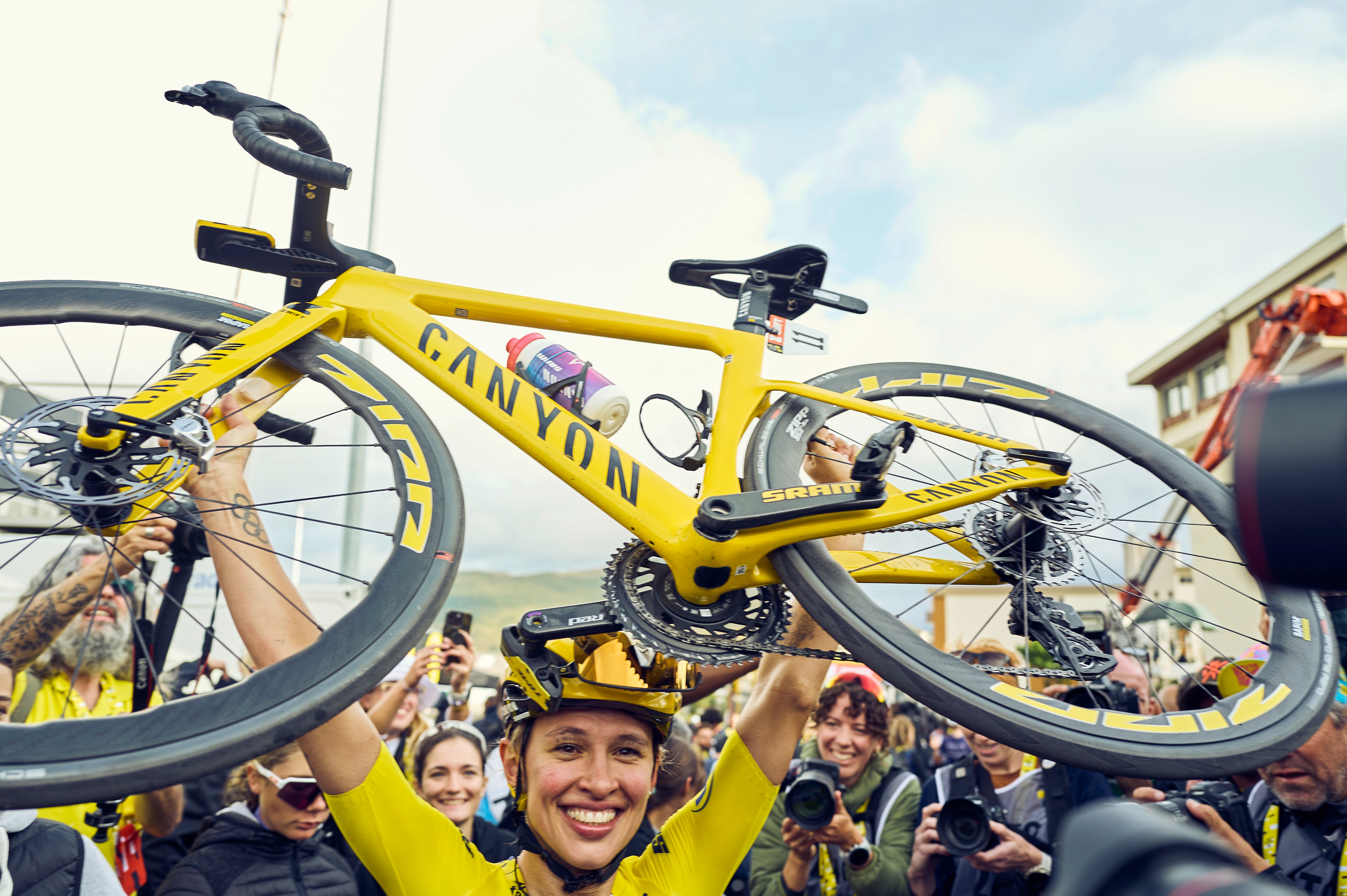
Niewiadoma tells a story of riding hand-me-downs from her older siblings as a child in the south of Poland, and wishing to get her own bike as a first communion present.
“Usually you always get a bike, that was a standard gift. I was waiting so I could finally get my first fresh, brand new bike. And I remember I was just so desperate because I was receiving different gifts, but no bike. I remember this huge disappointment, I was crying. The next day my dad drove me to a store and got me a bike.”
Cycling was fun, but it also delivered a sense of liberation.
“I remember very vividly that I was just so happy ripping the bike with my friends, because that was a way that allowed us kids to explore other neighbourhoods, to move a little bit further without our parents knowing about it. It was like a tool for freedom.”
Niewiadoma has ridden a tortured road to the top step of the Tour de France. In her early years she would scold herself when things didn’t go her way. She suffered crippling doubt in the face of intimidating riders, refusing to believe she could beat established champions even if she had the legs. That mentality changed last year when Niewiadoma won the Gravel World Championships, leaving Vollering behind on a steep climb.
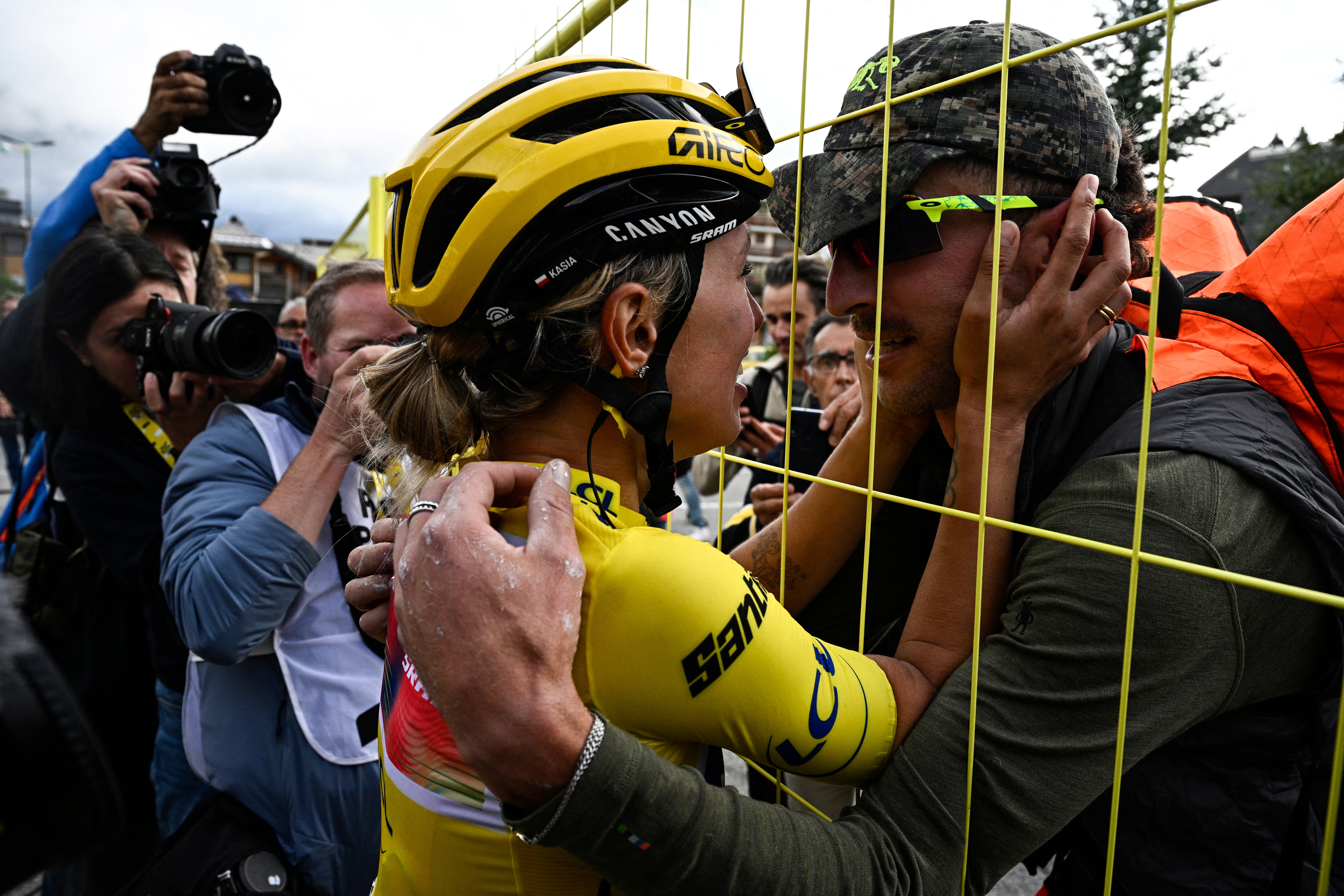
She spent the spring building her endurance on hard climbs at high altitude so that she was ready to attack Alpe d’Huez and prepared for the hurt. There, she wrote a piece of cycling history, a scene of sporting theatre to be rewatched over and over.
Though not by Niewiadoma.
“I think I will never watch it to be honest! I experienced it once and I think it’s enough. I like just leaving whatever it was behind me, and I feel like it causes some sort of stress and weird feelings, so I rather avoid it. I want to move past whatever happened and just enjoy the magical four seconds.”
Join our commenting forum
Join thought-provoking conversations, follow other Independent readers and see their replies
Comments